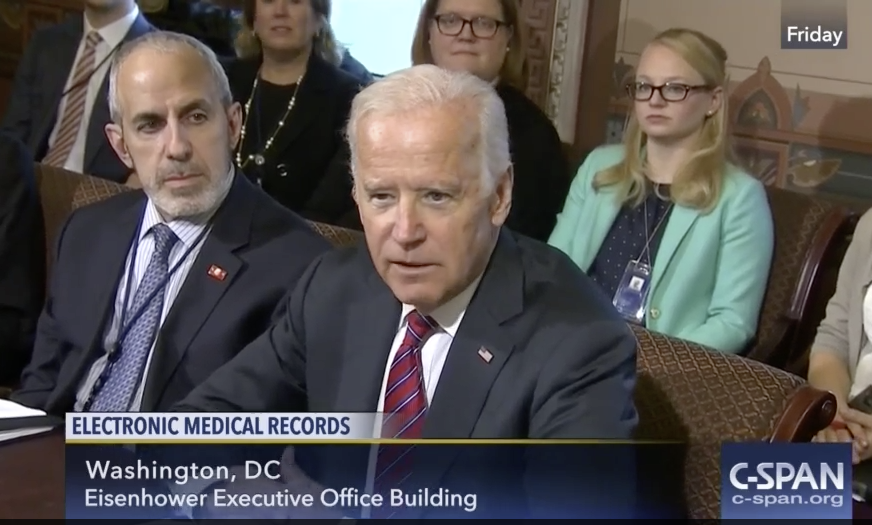HITECH Act
See the following -
Humetrix Presents Disruptive Personal Health App Solutions Before US Congress
 As a former practicing physician, data scientist and public health officer, I became a healthcare IT entrepreneur focusing on mobile technology because I believed that the best way to treat patients, improve health outcomes, and reduce waste is to put patients’ critical health information into their own hands, so they can share that information with their physicians when needed. With 68 percent of Americans using a smart phone daily1, and new HIPAA rules giving each of us a legal right to electronically access our health records, consumer facing mobile health applications can be a cure to the information blocking which is still plaguing our health care system. In a healthcare environment in which one-third of expenditures are wasted3 on redundant care, and medical errors representing the third leading cause of death in the U.S. today4, having immediate access to a patient’s health history can literally save lives and also significantly reduce healthcare costs.
As a former practicing physician, data scientist and public health officer, I became a healthcare IT entrepreneur focusing on mobile technology because I believed that the best way to treat patients, improve health outcomes, and reduce waste is to put patients’ critical health information into their own hands, so they can share that information with their physicians when needed. With 68 percent of Americans using a smart phone daily1, and new HIPAA rules giving each of us a legal right to electronically access our health records, consumer facing mobile health applications can be a cure to the information blocking which is still plaguing our health care system. In a healthcare environment in which one-third of expenditures are wasted3 on redundant care, and medical errors representing the third leading cause of death in the U.S. today4, having immediate access to a patient’s health history can literally save lives and also significantly reduce healthcare costs.
- Login to post comments
Hurricanes Harvey and Irma Draw the Line - Time for the US to Embrace Open Source Emergency and Disaster Response
 For nearly 20 years now the global open source community and applications have been a keystone to disaster relief efforts around the world. The enormous number of disaster relief applications and knowledge that has been developed through all these years, should, and needs to be leveraged in the current crisis. For that reason, Open Health News is starting a series of articles to highlight some of the most important solutions. A substantial portion the open source applications for emergency and disaster response that exist are actually already on the news website in the form of articles and resource pages.
For nearly 20 years now the global open source community and applications have been a keystone to disaster relief efforts around the world. The enormous number of disaster relief applications and knowledge that has been developed through all these years, should, and needs to be leveraged in the current crisis. For that reason, Open Health News is starting a series of articles to highlight some of the most important solutions. A substantial portion the open source applications for emergency and disaster response that exist are actually already on the news website in the form of articles and resource pages.
- The Future Is Open
- Login to post comments
Integrating EHRs to Clinical Research EDC Systems
It has been a longstanding challenge to integrate patient data from EMRs (Electronic Medical Record systems) with EDC (Electronic Data Capture) systems for clinical studies and trials...These hurdles have been so high that the task has rarely been attempted in earnest, let alone accomplished in any significant way. That is until recently. How are these challenges being overcome today? What changes have allowed this integration to be to considered and implement today? The answer is: lots!
- Login to post comments
Is The 1.5+ Trillion Dollar HITECH Act a Failure?
 Hopefully, the public statements made by President Obama and Vice President Biden will lead to a public debate over the monumental problems that the HITECH Act and proprietary EHR vendors have caused the American people. While the press continues to report the figure of $35 billion as the cost of implementing EHRs, that figure does not tell the entire story. Perhaps the next step is to provide accountability and transparency. That would start with firm numbers regarding the real costs of EHR implementations forced on an unprepared healthcare system by the HITECH Act.
Hopefully, the public statements made by President Obama and Vice President Biden will lead to a public debate over the monumental problems that the HITECH Act and proprietary EHR vendors have caused the American people. While the press continues to report the figure of $35 billion as the cost of implementing EHRs, that figure does not tell the entire story. Perhaps the next step is to provide accountability and transparency. That would start with firm numbers regarding the real costs of EHR implementations forced on an unprepared healthcare system by the HITECH Act.
- The Future Is Open
- Login to post comments
LinkedIn users: EHRs plagued by poor design, clinical disconnect
It doesn’t take much to get clinicians to express their opinions about EHRs riddled with inefficient, cumbersome, and frustrating interfaces. EHR backlash is at an all-time high, so EHRintelligence asked LinkedIn users how we can turn the dissatisfaction around. The resulting comments pointed to a fundamental disconnect between design and daily use, and unleashed significant criticism of the government’s push for EHR adoption before vendors could produce a product worth using. Read More »
- Login to post comments
Mother Jones piece hits Epic hard: 5 criticisms of the EHR vendor
For a company that is notorious for its lack of media interaction, Epic Systems often finds itself in headlines, for better or for worse. The latest Epic media storm was delivered by a Mother Jones piece in which the author criticized the vendor and the health IT marketplace as failing in its mission to help patients and save money through digitization. Author Patrick Caldwell wrote the healthcare industry has largely underachieved in its goal to digitize medical records and cut waste and costs associated with paper records.
- Login to post comments
Navigating between Heavy-weight and Light-weight Standardization
 Andy Oram
Andy Oram
FHIR is large and far-reaching but deliberately open-ended. Many details are expected tovary from country to country and industry to industry, and thus are left up to extensions that various players will design later. It is precisely in the extensions that the risk lurks of reproducing the Tower of Babel that exists in other health care standards. The reason the industry have good hopes for success this time is the unusual way in which the Argonaut project was limited in both time and scope. It was not supposed to cover the entire health field, as standards such as the International Classification of Diseases (ICD) try to do. It would instead harmonize the 90% of cases seen most often in the US. For instance, instead of specifying a standard of 10,000 codes, it might pick out the 500 that the doctor is most likely to see.
- Login to post comments
Obama and Biden Blast EHR Vendors for Data Blocking
 As they are winding their terms in office, President Barack Obama and Vice President Joe Biden dropped a stink bomb on the health IT industry. Speaking at different events on Friday, January 9th, the President and Vice President both criticized proprietary electronic health record (EHR) vendors as the primary obstacle to the success of their administration’s health care strategy. This is the highest level acknowledgment so far of the serious impact that “lock-in” EHR software vendors are having on America’s medical infrastructure and the ability of physicians to provide medical care.
As they are winding their terms in office, President Barack Obama and Vice President Joe Biden dropped a stink bomb on the health IT industry. Speaking at different events on Friday, January 9th, the President and Vice President both criticized proprietary electronic health record (EHR) vendors as the primary obstacle to the success of their administration’s health care strategy. This is the highest level acknowledgment so far of the serious impact that “lock-in” EHR software vendors are having on America’s medical infrastructure and the ability of physicians to provide medical care.
ONC Releases 2018 HITECH Report
 In early January the Office of the National Coordinator for Health Information Technology (ONC) issued its annual report to Congress for 2018 on the adoption of electronic health records (EHR) and interoperability. This report is required under the HITECH Act and is further informed by requirements of the later 21st Century Cures Act...One thing that I think is notable was a short discussion about barriers to interoperability that we have heard before. The report identifies three types: technical barriers, financial barriers, and trust barriers. Within trust barriers the report mentions legal incentives to keep data from moving (I guess that would have better been phrased as legal disincentives to sharing), but this misses the point: It is the patchwork of inconsistent and incompatible State and local laws and regulations - not intentional information blocking - that presents a bigger challenge and barrier.
In early January the Office of the National Coordinator for Health Information Technology (ONC) issued its annual report to Congress for 2018 on the adoption of electronic health records (EHR) and interoperability. This report is required under the HITECH Act and is further informed by requirements of the later 21st Century Cures Act...One thing that I think is notable was a short discussion about barriers to interoperability that we have heard before. The report identifies three types: technical barriers, financial barriers, and trust barriers. Within trust barriers the report mentions legal incentives to keep data from moving (I guess that would have better been phrased as legal disincentives to sharing), but this misses the point: It is the patchwork of inconsistent and incompatible State and local laws and regulations - not intentional information blocking - that presents a bigger challenge and barrier.
- Login to post comments
ONC Selects Noam Arzt to serve on the ONC Trusted Exchange Framework Task Force
 The Office of the National Coordinator for Health Information Technology (ONC) has selected Dr. Noam H. Arzt, President of HLN Consulting (HLN), as a member of the Trusted Exchange Framework Task Force. This group of healthcare and health information technology specialists will advise ONC on various aspects of the Draft Trusted Exchange Framework. This framework outlines a common set of principles for trusted exchange of health information records and minimum terms and conditions for trusted exchange as directed by Congress in the 21st Century Cures Act.
The Office of the National Coordinator for Health Information Technology (ONC) has selected Dr. Noam H. Arzt, President of HLN Consulting (HLN), as a member of the Trusted Exchange Framework Task Force. This group of healthcare and health information technology specialists will advise ONC on various aspects of the Draft Trusted Exchange Framework. This framework outlines a common set of principles for trusted exchange of health information records and minimum terms and conditions for trusted exchange as directed by Congress in the 21st Century Cures Act.
- Login to post comments
Open Health News Continues To Grow-Visitors Cross the 375,000 Mark
We have been very busy lately and did not have time this year to write a recap of major events related to our news web site. Well, a bit late, we start here with a review of our traffic figures. Traffic to the website continues to grow and we are now approaching 20,000 unique visitors per month. As the table shows below, the total number of unique visitors since we launched the site nearly four years ago has surpassed 375,000 and the total number of Page Views has broken the 8 million mark.
- The Future Is Open
- Login to post comments
Open Source Electronic Health Records For Education And Training
 In spite of being very involved in the field of Health Informatics I only recently became aware of VistA for Education (VFE), which has all of the aforementioned attributes of an excellent solution for EHR education purposes. VFE was developed as a result of a grant from the Office of the National Coordinator (ONC) to supplement the ONC Health Information Technology (HIT) curriculum. Electronic health records (EHRs) are more than just the electronic equivalent of paper-based health records. Electronic health data is easier to search, share and archive, compared to paper records. Additionally, EHRs can be embedded with clinical decision support to alert and remind physicians of patient safety and preventive medicine measures.
In spite of being very involved in the field of Health Informatics I only recently became aware of VistA for Education (VFE), which has all of the aforementioned attributes of an excellent solution for EHR education purposes. VFE was developed as a result of a grant from the Office of the National Coordinator (ONC) to supplement the ONC Health Information Technology (HIT) curriculum. Electronic health records (EHRs) are more than just the electronic equivalent of paper-based health records. Electronic health data is easier to search, share and archive, compared to paper records. Additionally, EHRs can be embedded with clinical decision support to alert and remind physicians of patient safety and preventive medicine measures.
OSEHRA 2015 Summit to Feature Several Major Open Health IT Projects
 The 2015 OSEHRA Open Source Summit is opening in two days with a panel addressing the need for the open health community to join forces and work together to change the current health IT paradigm from expensive and outdated pre-internet mainframe solutions to innovative open solutions. The panel brings together six leaders from diverse open health communities and technologies to discuss how the community can join forces. I have the honor of being the moderator of the panel. The speakers for the Open Health panel are...
The 2015 OSEHRA Open Source Summit is opening in two days with a panel addressing the need for the open health community to join forces and work together to change the current health IT paradigm from expensive and outdated pre-internet mainframe solutions to innovative open solutions. The panel brings together six leaders from diverse open health communities and technologies to discuss how the community can join forces. I have the honor of being the moderator of the panel. The speakers for the Open Health panel are...
OSEHRA Community Responds to the Federal Government's Proposed Open Source Policy
 The OSEHRA community today submitted a response to the "Draft Open Source Policy for Federal Agencies" released by the White House on March 10. The policy was open for comments through today. This is a major milestone for the OSEHRA community as well as the open source community as a whole. Currently the US Government spends nearly a hundred billion dollars a year on software purchased from the private sector or procured from government contractors. Most of this software acquisition ends up in failure. President Barack Obama has made it a priority to shift technology acquisition policies to solve this problem and restore technology innovation by embracing open source.
The OSEHRA community today submitted a response to the "Draft Open Source Policy for Federal Agencies" released by the White House on March 10. The policy was open for comments through today. This is a major milestone for the OSEHRA community as well as the open source community as a whole. Currently the US Government spends nearly a hundred billion dollars a year on software purchased from the private sector or procured from government contractors. Most of this software acquisition ends up in failure. President Barack Obama has made it a priority to shift technology acquisition policies to solve this problem and restore technology innovation by embracing open source.
- The Future Is Open
- Login to post comments
Patient Health Information Precariously Safeguarded, According to Privacy Analytics
According to a new infographic compiled by Ottawa data privacy company Privacy Analytics, costs associated with a data breach, including notification, legal fines, legal fees, forensics, PR, etc., amounts to approximately $208 per person. While data breaches across the board are damaging, from major corporate leaks like Target to member-based services like Ashley Madison, it’s the leaking of personal health information (PHI) that is most sensitive and which Privacy Analytics specializes in...
- Login to post comments